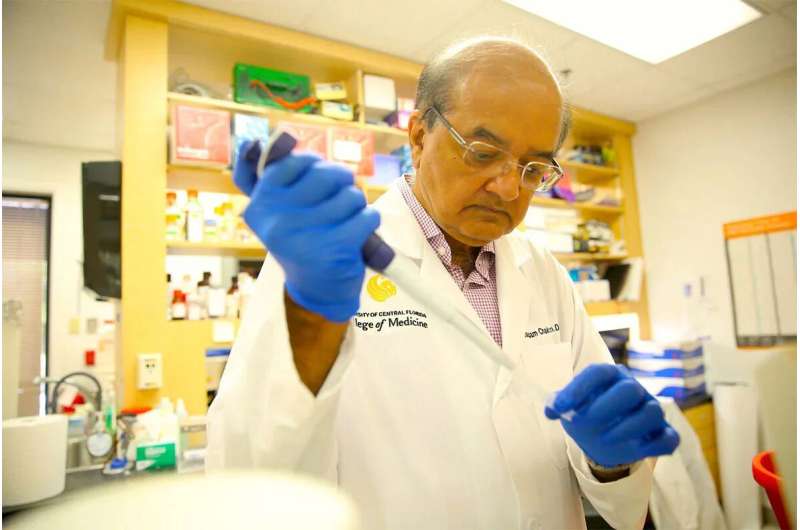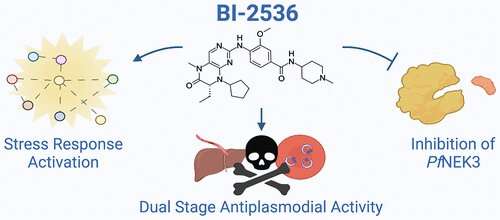This article has been reviewed according to Science X's editorial process and policies. Editors have highlighted the following attributes while ensuring the content's credibility:
fact-checked
peer-reviewed publication
trusted source
proofread
Cancer drugs show potential in fight against malaria

With malaria becoming increasingly drug-resistant, a team of UCF researchers is looking to use cancer drugs to accelerate the discovery of new life-saving therapies for the disease.
In a study, UCF molecular parasitologist Debopam Chakrabarti and cancer molecular biologist Ratna Chakrabarti are partnering with Nathanael Gray, co-leader of the cancer therapeutics research program at Stanford University and Elizabeth Winzeler, a malaria drug development expert from the University of California San Diego, to test cancer drugs for malaria-fighting properties. Their most recent findings were published in the ACS Infectious Diseases journal.
Caused by parasites belonging to Plasmodium species and transmitted by the bite of infected mosquitoes, malaria is life-threatening and is one of the world's most common infectious diseases. It is responsible for over 600,000 deaths per year, predominantly in sub-Saharan Africa. About 80 percent of these deaths are children under age 5.
"Over time, genetic mutation of the malaria parasite makes it resistant to current drugs," Chakrabarti says. "The World Health Organization reported that malaria parasites are increasingly becoming resistant to the current therapy used to treat malaria, which was discovered in the 1990s. So, new and more effective drugs for malaria are long overdue as about 30 years have gone by since we have had a new class of compounds in the market against malaria."
But drug discoveries can take years, even decades, Chakrabarti explained, as compounds go through many phases of testing for efficacy and safety.
"One of the ways we can accelerate the discovery of new treatment options is to use existing drugs that are already approved by the Food and Drug Administration," Chakrabarti saiys. "This is called taking a piggyback approach, looking at existing drugs that are already on the market to see if they have anti-malarial properties. This will help to shorten the initial stages of drug discovery which is usually quite time-consuming."
To meet the urgent need for new drugs, the team decided to repurpose protein kinase inhibitors—drugs originally developed for cancer treatment—for an accelerated path to drug therapy for malaria. Protein kinases are enzymes that regulate proteins in the body and are heavily targeted for cancer and other disease therapies by the pharmaceutical industry. Protein kinases are very important for the malaria parasite's life cycle and as such make good drug targets.

As part of the study, Ph.D. candidate Monica Bohmer, working under Chakrabarti's supervision, tested a range of anti-cancer protein kinase inhibitors to identify inhibitors that are known to target human Polo-like kinase, a type of protein kinase that plays an important role in cell division in humans. She discovered that a group of inhibitors, specifically BI-2536, a known human Polo-like kinase 1 inhibitor, exhibited strong anti-malarial properties.
"While the malaria parasite plasmodium does not have Polo-like kinases, the protein kinase inhibitors targeted another family of proteins called NEK, which also regulate cell division," Bohmer says. "They also targeted other stress-response pathways which helped to kill the parasite."
She added that future studies will explore the functions of these NEK proteins in the parasite.
"Overall, this study provides valuable insights for the potential of repurposing of protein kinase inhibitors for malaria treatment," Chakrabarti says "while also underscores the need for further research to identify additional targets and optimize the efficacy of these inhibitors."
More information: Monica J. Bohmer et al, Human Polo-like Kinase Inhibitors as Antiplasmodials, ACS Infectious Diseases (2023). DOI: 10.1021/acsinfecdis.3c00025





















